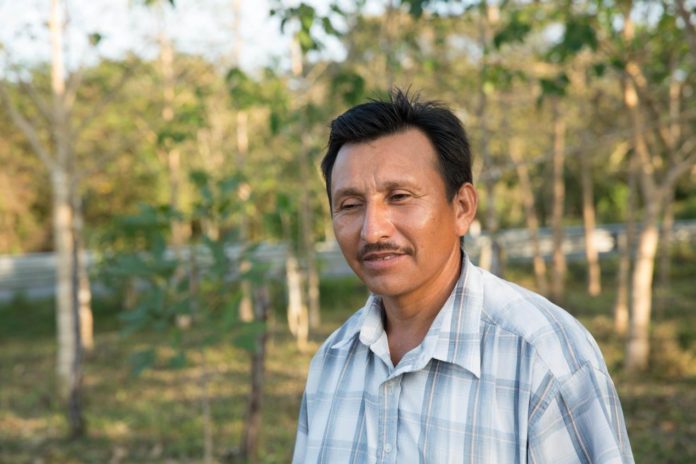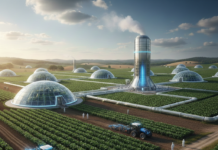UN’s International Fund for Agricultural Development (IFAD) and the Government of Mexico have signed a financial agreement today that will support the implementation of the Balsas Basin – Reducing Climate Vulnerability and Emissions through Sustainable Livelihoods Project (Balsas Project), a rural development operation aimed to fight rural poverty by reducing small-scale farmers’ vulnerability to climate change in one of the Mexican regions most affected by this phenomenon.
The Balsas Project will have a total investment of US$ 55 million ($38.45 million from IFAD and $13.35 million from Mexico’s Government) and will benefit around 59,000 people — 40 per cent of them women and 30 per cent of them youth. An additional $54 million in funding from the Green Climate Fund (GCF) is expected to be confirmed in the following months, increasing the project’s total investment to $109 million and the number of participants to more than 162,000 people.
“Climate adaptation investments are greatly needed to counter the effects climate change is already having on the lives of small farmers, especially in most vulnerable regions like the Balsas Basin. These type of investments, especially those in sustainable agroforestry, have proven effective in reducing poverty and promoting development,” said IFAD’s Director for Latin America and the Caribbean, Rossana Polastri.
Despite being the second largest economy in Latin America and the Caribbean and ranking high on the Human Development Index, Mexico continues to face structural barriers to inclusive rural growth, which are further aggravated by gender, age, ethnic and territorial inequalities. In 2018, poverty affected 41.9 per cent of the population (52.4 million people), and the COVID-19 crisis has pushed another 9.5 million people into poverty.
Other than economic inequality and poverty, Mexican populations suffer from significant food security and nutrition challenges. Due to the COVID-19 pandemic, 44 per cent of households in Mexico need food assistance. Guerrero and Oaxaca states, both in the Balsas Basin, have some of the most severe limitations in food access.
This region also faces the dire consequences of climate change, as it is one of the two Mexican regions with the highest climate vulnerability. Future climate scenarios predict greater variability in temperatures, a 10-20 per cent decrease in rains and an average sea level rise of 1-2 meters. This is expected to reduce agricultural productivity and forest and mangrove cover and increase coastal flooding.
The Balsas Project is aimed to address these multiple challenges by supporting and fostering initiatives already put in place by the Government’s 2019-2024 National Development Plant. It will contribute to reducing the vulnerability of poor rural people to climate change, recovering and conserving ecosystems and their services, and strengthening the production systems of the Balsas Basin.
The project area encompasses eight states —Guerrero, Jalisco, Mexico, Michoacán, Morelos, Oaxaca, Puebla and Tlaxcala—, but the project interventions will focus on municipalities with the highest marginalization, rurality and climate vulnerability levels. The target population is primarily comprised of small-scale farmers and Indigenous and Afro-descendant communities living in poverty. The Balsas Project will work with their organizations, cooperatives and collective land property communities to enhance their living standards.
The project will promote initiatives, such as putting in place climate monitoring and alert systems and plans that integrate governmental, private and community resources and help small-scale farmers make the right decisions about planting and harvesting times and the types of crops they should dedicate their efforts. It will also promote the elaboration of land use plans, as well as initiatives to increase small-scale farmers’ productivity and participation in sustainable and profitable agricultural value chains.
To achieve all this, the project will heavily invest in technical assistance focused on the conservation, restoration and sustainable management of ecosystems. Specifically, investments and assistance will support sustainable processing and valuation of timber and non-timber forest products; strengthening of indigenous food systems based on traditional knowledge and products; and improved access to water.
The project will also foster existing partnerships between the National Forestry Commission (CONAFOR) and two national development banks: Fideicomisos Instituidos en Relación con la Agricultura (FIRA) and Financiera Nacional para el Desarrollo Agropecuario Rural Forestal y Pesquero (FND), to facilitate farmers’ organizations access to credit.
Since IFAD started its engagement with Mexico in the 1980s, the Fund has invested in 12 projects in the country with a total value of $462.41 million ($252.34 million from IFAD funds), benefitting more than 143,000 rural families.








